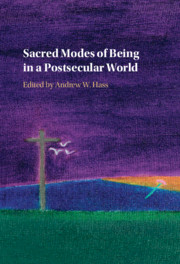Book contents
- Sacred Modes of Being in a Postsecular World
- Reviews
- Sacred Modes of Being in a Postsecular World
- Copyright page
- Contents
- Figures
- Contributors
- Acknowledgements
- Introduction
- Part I Jasper’s Sacred Mode of Being
- Part II Theology’s Cultural Mode of the Sacred
- Part III Culture’s Theological Mode of the Sacred
- Chapter 7 The Interdisciplinary Nature of Literature and Theology
- Chapter 8 William Blake as leitourgos
- Chapter 9 Bodies Dead or Alive?
- Chapter 10 The Desert Is in the Words We Speak
- Afterword
- Bibliography
- Index
Chapter 9 - Bodies Dead or Alive?
Intermediality, Ambiguity, and the Politics of Dying
from Part III - Culture’s Theological Mode of the Sacred
Published online by Cambridge University Press: 07 September 2021
- Sacred Modes of Being in a Postsecular World
- Reviews
- Sacred Modes of Being in a Postsecular World
- Copyright page
- Contents
- Figures
- Contributors
- Acknowledgements
- Introduction
- Part I Jasper’s Sacred Mode of Being
- Part II Theology’s Cultural Mode of the Sacred
- Part III Culture’s Theological Mode of the Sacred
- Chapter 7 The Interdisciplinary Nature of Literature and Theology
- Chapter 8 William Blake as leitourgos
- Chapter 9 Bodies Dead or Alive?
- Chapter 10 The Desert Is in the Words We Speak
- Afterword
- Bibliography
- Index
Summary
Both in painting and in film, Christian symbols, especially allusion to the Passion with an emphasis on its ambiguous status of the body, occurs frequently. This chapter examines paintings about dying that show up in films, in what is called intermediality. What the author gleans from Jasper’s work is an attempt to overcome binary oppositions and the separations they entail. The bridge is the imagination, which compels us to take fiction seriously as a knowledge-producing field. If we take Coleridge’s definition of fiction, “the willing suspension of disbelief”, we can see that the three main words help us to be serious about guilt and responsibility, but also about liberation, the latter through the release of fantasy. It is this view of fiction that makes it possible to overcome the dichotomies that rule the world, including the one between sacred and profane. This dichotomy is explored in works of visual art about the body, and especially the dying body, by Velázquez, Grünewald, Mantegna, Zvjagintsev’s film The Return, and the film/video project Madame B by Bal and Williams Gamaker.
Keywords
- Type
- Chapter
- Information
- Sacred Modes of Being in a Postsecular World , pp. 183 - 204Publisher: Cambridge University PressPrint publication year: 2021

